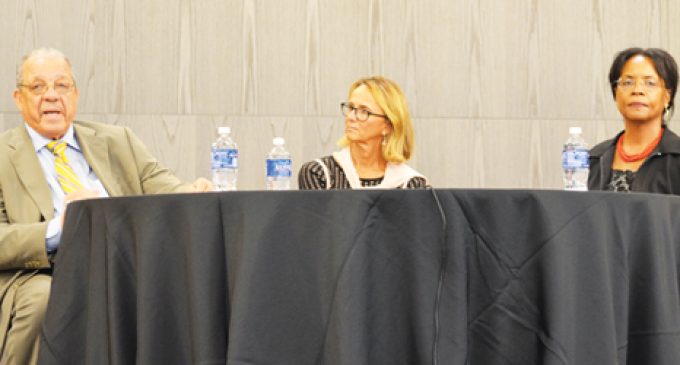The Right to Quality Education?

Leaders say the law makes no such assurances
(pictured above: Panelists David Dennis with Superintendent Beverly Emory (center) and moderator Denise Pearson, a senior associate dean and professor of education at Winston-Salem State University.)
From free speech to a speedy trial, the Constitution lays out a bevy of rights for Americans. Quality education, however, is not among them.
Theodore M. Shaw said that fact is evident across the country.
“Unfortunately, there is no constitutional right to quality education under our federal constitution,” he said. “The battle for quality education for African-Americans has to continue because education remains the engine of opportunit, and we have to think about coming at it, not only through law, but political activism and any measure that we can. The struggle continues.”
Shaw, the inaugural Julius L. Chambers Distinguished Professor of Law and director of the UNC Center for Civil Rights at UNC Chapel Hill, gave the annual J. Alston Atkins Memorial Lecture in Constitutional Law at Winston-Salem State University last Thursday.
For more than 20 years he fought for equal education and other rights as a counsel in the NAACP Legal Defense Fund. He said remnants of the hurdles that stood between blacks and education are still apparent in classrooms and in test scores.
“For African-Americans, there was a time when education was not available,” Shaw said prior to his address. “In fact, it was illegal to learn to read or to teach a slave to read. In the post-slavery era and the Jim Crow days, education was segregated, meaning that they (blacks) were secondary in terms of quality, resources and everything else.”
Although Brown versus Board of Education, which turned 60 this year, ostensibly ended separate but equal education, Shaw said it took years to give the historical ruling real meaning and translate it into reality. Those challenges remain as schools with high minority populations, especially, fight for quality education.
The topic was also broached by Winston-Salem/Forsyth County Schools Superintendent Beverly Emory and David Dennis, director of the South Carolina-based Southern Initiative Algebra Project, during a roundtable that preceded Shaw’s lecture.
Dennis, who directs a nonprofit that strives to have all students algebra proficient by the end of their 8th-grade year, said that there is a move afoot to address education’s deficiencies by completely changing the public education model.
“The switch and change in education in the country is to move towards the privatization of education,” he said. “New Orleans is now 100 percent charter schools. They see that students are now performing at a lower level than students in public schools.”
Dennis said the change in New Orleans was precipitated by Hurricane Katrina. Teachers had to reapply for the jobs after schools were rebuilt. Many were replaced by educators fulfilling their requirement for Teach for America, which provides college funds to students who agree to teach in under performing school systems. According to Dennis, the privatization /charter school model started soon thereafter.
Both he and Emory, who has been superintendent for just over a year, agreed that there should be a duty – since no Constitution guarantee exists – to provide quality education to all students.
Emory, who taught for years before becoming an administrator, said her first principalship drove home the realities of the problems.
“It wasn’t until I took my first principal job in Darlington County, South Carolina that I really saw first-hand the inequalities; this was in 1988,” she said.
Emory asked those in attendance to make quality education a priority by becoming advocates. Moriah Paige, a freshman majoring in psychology, said that sounded like a good idea.
“I feel like we should take the challenge to be the leaders … and initiate the movement,” she said.
WSSU holds J. Alston Atkins events each year to honor the legacy of one of the South’s foremost desegregation champions. The son of WSSU founder Simon Green Atkins, J. Alston Atkins filed a series of suits to end segregation in Forsyth County that are credited with teeing up the desegregation victories that would eventually come. The Yale-educated lawyer filed a suit against the UNC system that led to increased funding for the state’s public black schools like WSSU.
















